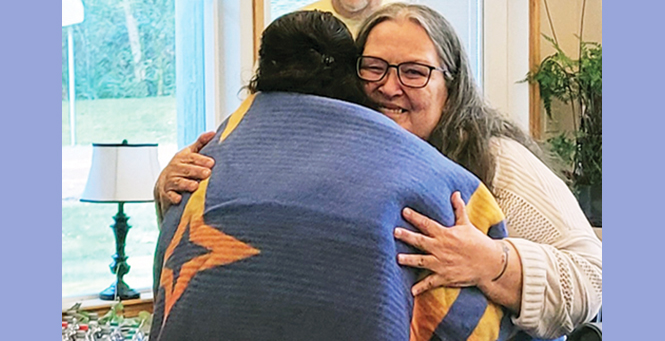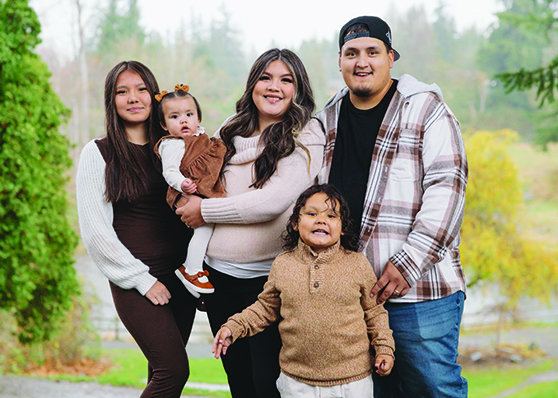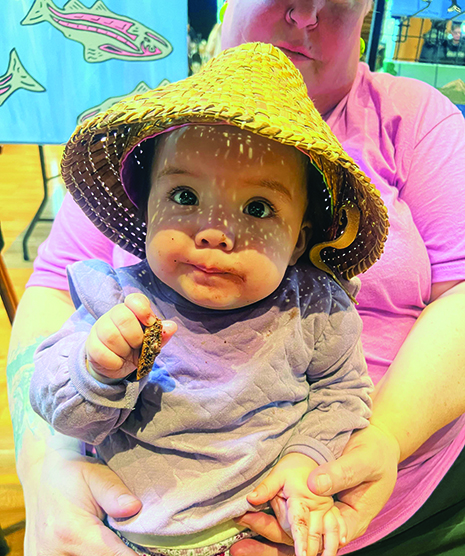
By Kalvin Valdillez, Tulalip News
“I did receive a Pendleton and a blanketing ceremony! It was very emotional because they (beda?chelh team) all seen the growth, because I did grow a lot through the program. I was able to dig deeper into why I do what I do and why I think the way I do. And I’m really thankful that they acknowledge the work that is put in, that they acknowledge that you are a good parent. I feel that’s very important.”
-Jaida Wasko, Tulalip Parent/beda?chelh client
Shelly Lacy and her team at beda?chelh have been on a mission to reinstill trust with their clients since she took the helm at the Tribe’s child welfare program. This effort is to show the community that their number one goal is to keep Tribal families together and to reunite children with their parents, if the court removes them from the home.
A common misconception about the program is that beda?chelh’s only interest is separating the kids from their parents, and that beda?chelh makes the final decision to place them in another home. When in actuality, their role is to assess the child’s living environment and open a case if there’s a safety issue that calls for removal.
Following a co-investigation with the state, the Tribal court system will determine if the child needs to be placed in another home or can remain with the family. beda?chelh is there regardless of the outcome to help you plan your next step, whether that’s addressing those issues with the children still living in the home or beginning the reunification process.
Jaida Wasko, Tulalip Parent and beda?chelh client, recently regained custody of her kiddos. In an interview with Tulalip News, she expressed a great amount of gratitude for beda?chelh and her caseworker. And though her partner may have had a slightly different experience with beda?chelh, she credits the program for their growth as parents and states that with their help, they were able to reunite as a family in an expeditious fashion.
Said Jaida, “I feel like the program is protecting and looking out for the best interests of our children, whether or not people are able to see the hard work that they do. Because it is hard work pulling kids out of families when they don’t want to, but they have to. It’s case by case, but I feel it’s important for someone to step in and motivate parents to reunite and get better for the wellbeing of our kids. Because our kids need stability, discipline, structure. beda?chelh is a really good resource for people like me who are going through things, and they just can’t quite get out of it. They give me motivation to keep going.”
Through their latest efforts, like the implementation of a monthly cultural class for their families, beda?chelh is going the extra mile to show that they are a resource and not the enemy, that they care for the wellbeing of the kids and the entire family unit. And that they are there to support and uplift you through those challenging times.
“I had tested positive for fentanyl and meth, and my kids ended up having to come out of the home,” explained Jaida. “It was kind of hard because they were stuck between opening a case and not opening a case, because me and my husband were both functioning addicts. From the get-go, it was very hard, but they were very understanding. And at the end of the day, we are very thankful for the opportunities we did get. We were able to get help financially from them with clothing vouchers, food vouchers, gas vouchers. They were also able to get us into the same parenting classes, so we were able to do it together. It’s a lot of hard work, but if me and my husband can push through and do that work, anybody can.”

Upon the closure of a case, when the child is back in the care of their parents, Tribal Court usually holds a blanketing ceremony, accompanied by a prayer chant or song by local culture bearers. beda?chelh recently took this ceremony over, utilizing the event as an opportunity not only to acknowledge the families’ work of completing their journey with the program, but also to celebrate each accomplishment that their other clients make throughout their time with beda?chelh.
Shelly expressed, “That’s always the fun part of our job, because we get to celebrate that they’ve done it. We make sure to remind them of all their hard work, and how far they’ve come, because sometimes people think we don’t value their work. We want them to know how proud we are of the work they’ve done to get their kids back, reminding them that their kids will always remember the work that they’ve done for them. And then we’ll also award certificates at the celebration lunch, for every family that hits a major milestone.”
In Native America, a blanketing ceremony is held on momentous occasions, such as a graduation or a marriage, to honor your successes. The blanket serves as a physical reminder of your accomplishments and your growth through a certain phase of life, as well as an indicator that you are ready to begin your next journey. In traditional ceremonies or gatherings, blankets are a sign of wealth within tribal families, and to receive a blanket as a gift is a high honor.
When asked about the significance of the blanketing ceremony at beda?chelh, Shelly said, “Now, this is just how I think of it, because it depends on what family you’re in and where your beliefs come from. To me, when we wrap you in that blanket, we put our hopes for you, our love for you, our caring for you in that blanket. We are wrapping you in hope, love, and our caring, so when you’re having a rough day, you can wrap yourself up in that blanket and you can still feel that from us.”

With one last case on the verge of closure in the coming weeks, Jaida is excited to join the next blanketing ceremony and celebrate the work her family put in as well as the efforts made by other parents.
“It’s so awesome to see that they go out of their way to do blanket ceremonies for our people,” she said. “It was a surprise when it happened to me. I was surprised, it was emotional, and it shows that we truly do recover. My caseworker said she was so proud of us both, because they don’t see a lot of couples do it together. The way I look at it is our kids are our future. My kids are the most important people on the earth to me. And all the work that they do at beda?chelh is in the best interest of our kids, that’s who they are doing it for.”
Jaida and her family’s experience with beda?chelh is a good example of the saying ‘it works if you work it’. With many new success stories coming from beda?chelh, one could assess that team’s new hands-on approach and emphasis on celebrating their client’s victories is helping overturn that negative perception that many folks on the reservation hold against beda?chelh. One thing is for sure, the program is going to have to stock up on wool blankets as more parents are buying into the program, doing the work to reunite their families, and understanding the need for and the importance of the Tribe operating their own child welfare agency.
“It’s just about providing that extra layer of support for our clients. We really do want you to keep your kids, and we want to be there to help you get your kids back,” Shelly stated. “This is a way to really celebrate with the parents and give them that encouragement to keep going. Because it can feel like there is so much you have to do. It can seem like you have so far to go and you’re not going to make it. So, it’s important to stop and celebrate the work you’ve done.”
beda?chelh is planning to hold a blanket ceremony on the first Tuesday of every month to celebrate their clients’ accomplishments and inspire them to keep working toward reunification. The celebration will be held during the lunch hour at the beda?chelh headquarters. For more information, please contact Shelly Lacy at (360) 716-4059.